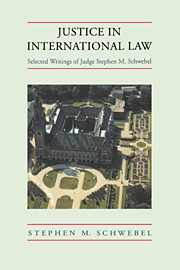Book contents
- Frontmatter
- Contents
- Preface
- PART I International Court of Justice
- PART II International Arbitration
- 10 Arbitration and the Exhaustion of Local Remedies (with J. Gillis Wetter)
- 11 Arbitration and the Exhaustion of Local Remedies Revisited
- 12 Some Aspects of International Law in Arbitration Between States and Aliens
- 13 The Majority Vote of an International Arbitral Tribunal
- 14 The Prospects for International Arbitration: Inter-State Disputes
- PART III United Nations
- PART IV International Contracts and Expropriation
- PART V Aggression under, Compliance with, and Development of International Law
- List of publications
- Index
13 - The Majority Vote of an International Arbitral Tribunal
Published online by Cambridge University Press: 06 November 2009
- Frontmatter
- Contents
- Preface
- PART I International Court of Justice
- PART II International Arbitration
- 10 Arbitration and the Exhaustion of Local Remedies (with J. Gillis Wetter)
- 11 Arbitration and the Exhaustion of Local Remedies Revisited
- 12 Some Aspects of International Law in Arbitration Between States and Aliens
- 13 The Majority Vote of an International Arbitral Tribunal
- 14 The Prospects for International Arbitration: Inter-State Disputes
- PART III United Nations
- PART IV International Contracts and Expropriation
- PART V Aggression under, Compliance with, and Development of International Law
- List of publications
- Index
Summary
Is a majority vote in an international Arbitral Tribunal, the compromis or governing rules of which provide for decisions by majority vote, dispositive, or may the effectiveness of that vote be challenged on the ground that one of the two arbitrators constituting the ostensible majority stated a position which shows that he did not support, or fully support, the award which was carried by his vote?
This question was one of two questions of interest to the international arbitration community on which the International Court of Justice ruled in 1991 in its judgment in the Case Concerning the Arbitral Award of 31 July 1989. On this question, the Court was unanimous.
How the issue came to be posed
In 1960, the predecessor States of Senegal and Guinea-Bissau, France and Portugal, exchanged letters for the purpose of defining the maritime boundary between Senegal (then an autonomous State in the French Community) and the then Portuguese province of Guinea. After the accession to independence of Senegal and Guinea-Bissau, a dispute arose between them concerning the delimitation of their maritime territories. In 1985, they concluded an Arbitration Agreement for submission of that dispute to arbitration, which in part provided:
The Government of the Republic of Senegal and the Government of the Republic of Guinea-Bissau,
Recognizing that they have been unable to settle by means of diplomatic negotiations the dispute relating to the determination of their maritime boundary,
Desirous, in view of their friendly relations, to reach a settlement of that dispute as soon as possible and, to that end, having decided to resort to arbitration.
- Type
- Chapter
- Information
- Justice in International LawSelected Writings, pp. 213 - 222Publisher: Cambridge University PressPrint publication year: 1994
- 1
- Cited by



